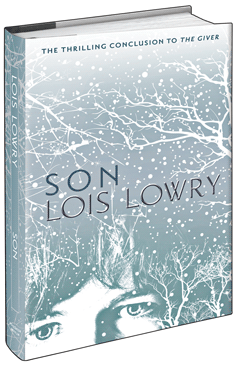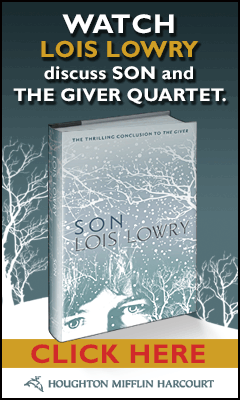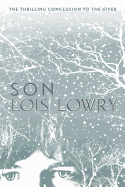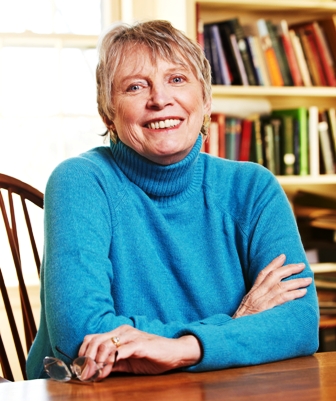Son
by Lois Lowry
With Son, Lois Lowry offers a spellbinding finale to her The Giver quartet, revisiting themes from her earlier titles in surprising, deeply resonant ways. While it is not necessary to have read the previous three books (The Giver; Gathering Blue; and Messenger), it is astonishing to see how Lowry has woven a web that connects all of her characters and their journeys into this moving, climactic finish.
Son begins in the community of The Giver, where children leave the Nurturing Center as Ones (one-year-olds) to be adopted by their new families, and the Chief Elder announces their vocations at the Ceremony of Twelve. Lowry here tells the story of Claire, assigned the role of Birthmother, though she had "secretly hoped for something more prestigious." Her older brother, for example, was selected for the Department of Law and Justice. But life in the Birthmothers' Dormitory with the other Vessels is good; she is well fed and even pampered. And after she produces three Products, Claire will be reassigned. We meet Claire at age 14, as she is being blindfolded in preparation for giving birth to her first Product. But something goes wrong, and they have to carve the Product out of her. "You've been decertified," she is told. Claire is "suffused with a desperate feeling of loss." She asks what the Product's number is, and she's told it's Product number 36. The official also lets slip that "he's fine," then corrects herself, "It... I mean that it's fine." But it's too late. Claire knows she gave birth to a son.
Lowry explores the nature of love between parent and child, the unnamable bond, forbidden in a community that places a high priority on detachment. She begins visiting the Nurturing Center, where they've taken Product 36, then starts volunteering there. She learns that her son has trouble sleeping at night, and that one of the Nurturers takes the child home with him at night, to relieve the strain on the evening shift. She arranges her day so she encounters the Nurturer riding his bike home with the child and overhears the Nurturer whisper the boy's name: Abe. In her new assignment at the Fish Hatchery, Claire sees her colleagues taking pills; everyone in the community takes them to numb their feelings. But the committee forgot to give Claire pills when she left the Birthmothers' Dormitory. Claire realizes it isn't "right" to have these feelings for her son, which grow stronger as the weeks pass. But she "would never, under any circumstances, stifle the feelings she had discovered. She would die, Claire realized, before she would give up the love she felt for her son."
Claire doesn't attend the first Ceremony after her new assignment to the Fish Hatchery, but she learns of two things: Product 36 has been deemed "uncertain" for assignment to a home, given his low weight and difficulty sleeping at night, and a Twelve has been assigned a special role in the community. This special Twelve is Jonas, son to the Nurturer who's been caring for Claire's boy. That's when fans of The Giver will realize that Claire's son is actually named Gabe. When Gabe is deemed "uncertain" for a second year, Claire fears the worst--but before she can think things through, Jonas disappears with the child, and Claire feels compelled to follow them.
Lowry divides Son into three distinct parts. The first lays out the parameters of the community and Claire's growing uneasiness with its strict rules. The second follows Claire's path to recovering her son and, in the process, her own identity. The third takes place in the village that Claire's son now calls home. Claire's journey brings together the heroes of Lowry's previous Giver books: Jonas from The Giver, Kira from Gathering Blue and Messenger. She also reintroduces the villain from Messenger, the Trademaster.
The beauty of the experience comes through in the language, the smells and sights of yet another community that Lowry introduces into the mix. Like Jonas in The Giver, Claire discovers colors, friendship and love as she recollects her memories. Each book in the quartet features a young person with an elder guide. Jonas had the Giver to teach him the community's history and its pooled memories; Kira had Annabella to show her the dyes for restoring the Singer's Robe; and Mattie had Seer to pass on his wisdom of the ways of the world. When Claire washes up in a strange land, Alys teaches her about herbs and healing. Claire lands there with all of her memories erased, and as she helps Alys deliver a baby, she remembers her own son, and her sense of purpose returns to her.
With these threads of continuity, both biological connection and chosen connection--teacher to student--Lowry suggests it takes all of their collective wisdom to overcome their greatest threat. The elders in The Giver and Gathering Blue believed that knowledge should be held by a few for the good of the many. In each of the four books, one brave young person leaves his or her community in order to save it, to make a better life, a better world. Jonas leaves his community in The Giver, Matty leaves his community in Gathering Blue and again in Messenger, and Gabe steps outside the bounds of his community in an attempt to save it. Unlike the elders from whom Jonas and Matty fled, the people of the community where Claire's son lives know--through painful trial and error--that only knowledge shared and freedom of choice can build strength among its citizens. Now they are put to an extreme test. Lois Lowry keeps the suspense mounting until the final pages in this stunning conclusion to her Giver Quartet. --Jennifer M. Brown








